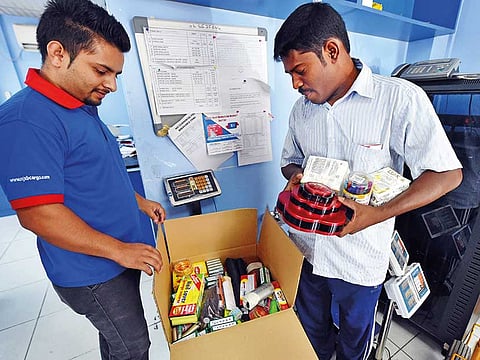8,000 expats hit hard by India’s new import rules
Packages sent by workers and low-income employees stuck over 41 percent tax

Abu Dhabi: Around 8,000 Indians in the UAE, mostly workers and low-income employees, are still waiting for gifts they sent last month through courier companies to be delivered to families and friends in India.
An overnight change in import rules made by the Government of India has resulted in a 41 per cent import duty being imposed on gifts and other goods for personal use since July 1, which has caused the delay, the head of a courier industry body told Gulf News on Monday.
“Around 250 tonnes of cargo has been held up at the Delhi and Mumbai airports since July 1. Cargo service operators were not in a position to clear about 200 tonnes of cargo at Delhi airport and 50 tonnes at Mumbai airport due to the 41 per cent tax imposed on June 30 without any prior notification,” Mohammad Ziad, president of Association of Courier Agents, told Gulf News on Monday.
The association represents 64 cargo businesses in the UAE, offering services to India.
As an average Indian customer sends 30kg to India, the situation has affected more than 8,000 people, Ziad said.
Mostly workers and other low-income employees send cargos to their families on special occasions as they are able to visit home once in two years only, he explained.
Earlier, gifts and goods for personal use worth 20,000 Indian rupees (Dh1,140) could be sent tax-free thanks to the exemption given by the government as per the notifications issued in 1993.
Low-income workers used this opportunity frequently as their 30kg package on average hardly went beyond 10,000 rupees (Dh570) in value, Ziad said. With an average Dh11 as courier charges, customers pay around Dh330 for a 30kg package, he said.
However, a copy of the notification issued by the Department of Revenue in the Indian Ministry of Finance dated June 30, said it has rescinded the previous notifications in 1993 (which gave exemption on duties), with effect from July 1.
A public notice issued by the Customs Department on July 7 said exemptions on duties would be applicable to gifts and goods for personal use worth 2,000 rupees (Dh114) only. Imports of higher value will attract a total of 41 per cent in taxes comprising 10 per cent basic customs duty, 3 per cent education cess and 28 per cent Integrated Goods and Services Tax.
Ziad said IGST was meant for goods and services in India and it was unreasonable to impose it on gifts sent by Indians living abroad.
“I don’t think this decision was taken by the political leadership. Earlier, only 10,000 rupees worth of gifts and related goods were eligible for duty exemption, but the current central government last year raised it to 20,000 rupees to help ordinary expatriates,” he said.
Moreover, it was unreasonable to impose the new taxes on goods sent from abroad before June 30, Ziad said.
Two prominent UAE-based courier companies have filed a petition before the Delhi High Court, challenging this particular decision and requesting the court to allow them to clear the goods sent before June 30 without paying the new taxes. The petitions supported by the association will be considered by the court on Wednesday.
“If the decision is not in our favour, we will clear the goods by paying the taxes and request the customers to compensate it,” Ziad said.
Now, customers have almost stopped sending gifts. “We used to send around 100 tonnes a day from the UAE, which has gone down to around five tonnes. An average customer may end up paying up to 4,000 rupees as taxes for an average 30kg package,” Ziad explained.



